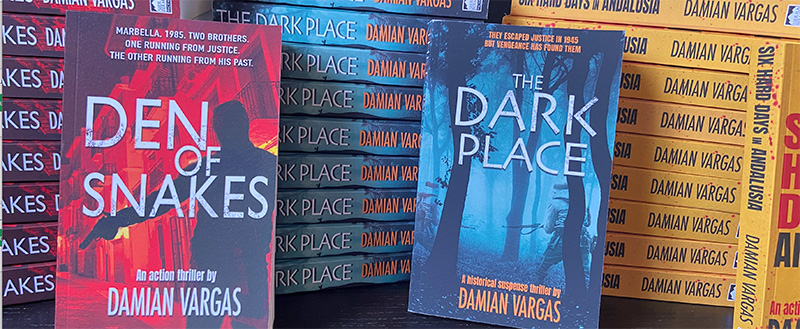I get asked this all the time as, I am quite certain, does every other author of fiction. On the one hand, I find this quite strange; everybody is making up stories all the time, aren’t they? Doesn’t your mind wander? Don’t you dream? But then, I suppose, there’s a difference between having an initial, sudden imaginative brainwave erupt in your head, and having the inclination and discipline to then sit down, capture it, add flesh to the bones, restructure, and reshape it, refine, and perfect it. That is the difference between someone who writes and someone who doesn’t. For every word you read, I probably typed 10.
I think that to power their imagination, anyone who aspires to be an author also needs to possess (and develop) a few other characteristics first.
You need to be observant
You need to be someone who notices stuff; someone who looks beyond the obvious and the overt, who sees the subtleties in the people and in the world around them. Seeing – and then consciously registering – the quirky ways of others; the nuances of how people dress, how they move, how they speak. Their body language, how they eat, how they drink, how they smoke. What they say, and what they don’t.
You need to be curious
Once you start to see the things that most people only subconsciously absorb, and start to catalog and classify that information, the next step is to ask; ‘Why is it so?’
Why did that woman almost rip that cigarette out of the packet, then take the longest first drag on a cigarette that you’ve ever seen, her shoulders taught, her eyes clamped shut, all the time oblivious to the stream of people being forced to divert around her as she stands motionless on a busy pedestrian walkway? What just happened to her? What’s going to happen to her?
Why is that old Spanish villager staring out across the arid Andalusian countryside, propped up on his gnarled wooden stick, his sorrowful eyes fixed on the yellowed, infertile plains below him, his face unmoving but his hands and legs trembling from the effort? Is he thinking of someone dear to him, long-since departed? Is he lost in painful memories of tough times? Of dark events he once witnessed, or dark deeds he once committed?
I think all of us, to some degree, construct personas and histories for the people we meet, even if in only a limited way, and subconsciously. That young woman who just joined your company; others consider her unremarkable, but you’re not so sure. There’s something about her. She acts in a diminutive way like she’s shy, but you’ve seen something else in her eye…a spark. A flame. A warning, perhaps? She’s hiding from her work colleagues, from you.
And once you have your brain in a state of constantly whirring away, noticing, wondering, then you need to build on that with two simple words…
What if?
What if that woman with the cigarette had just received a message to say that her former abusive husband has just been given parole? What if it had been her testimony that had put him in prison? What if he had sworn to find her the moment he got out of prison? What if he had told her that he’d come after her and that he’d kill her? What if she’d been to the police, but they hadn’t taken the threat seriously. What does she do? Where can she go?
What if that old Spaniard had stood at that very spot as a young boy, many decades ago, and had witnessed the murders of a dozen of his neighbors by an angry mob fueled on bitterness, resentment, and hate? What if he’d seen them spat at, kicked, beaten with sticks then thrown from the cliffs to into the deep gorge below? What if he had known some of those who died? What if some of the killers were still alive, still his neighbors?
And what if that young woman who just started working for your employer – a government agency that handles extremely sensitive information – is actually an agent of a foreign power? What if she’s there to steal that information? What if she noticed you watching her? What if she thinks that maybe you suspect who she really is? Are you in danger? Who can you tell, and would they believe you?
That’s where my ideas come from. In the main.
Of course, I get struck by random thoughts when I’m driving, when I’m out in the hills with my dogs, when I’m taking a shower, and when I’m desperate to get to sleep. But those ideas that come from a constant state of observing and curiosity, that I inculcate, germinate, foster, and develop – those are usually the ones that make it into my writing. And they tend to be the strongest and the most compelling because they are grounded in reality; the same reality that everyone else experiences, subconsciously absorbs then processes.
And that, I think, is the key. It’s where the relevance and the resonance come from. The reader might not realize that they’ve noticed the same event or wondered the same thought, but somewhere in the back of their mind a light came on, a red flag was waved. It triggered an endorphin release, a heightened sense of awareness. Their pulse rate increased, their eyes dilated. All from a sense of recognition. This isn’t just the author’s story, it’s their story. It’s your story. And you are now compelled to follow it, to see where it takes you. To see where it ends.
That, at least, is my theory. What do you think?

